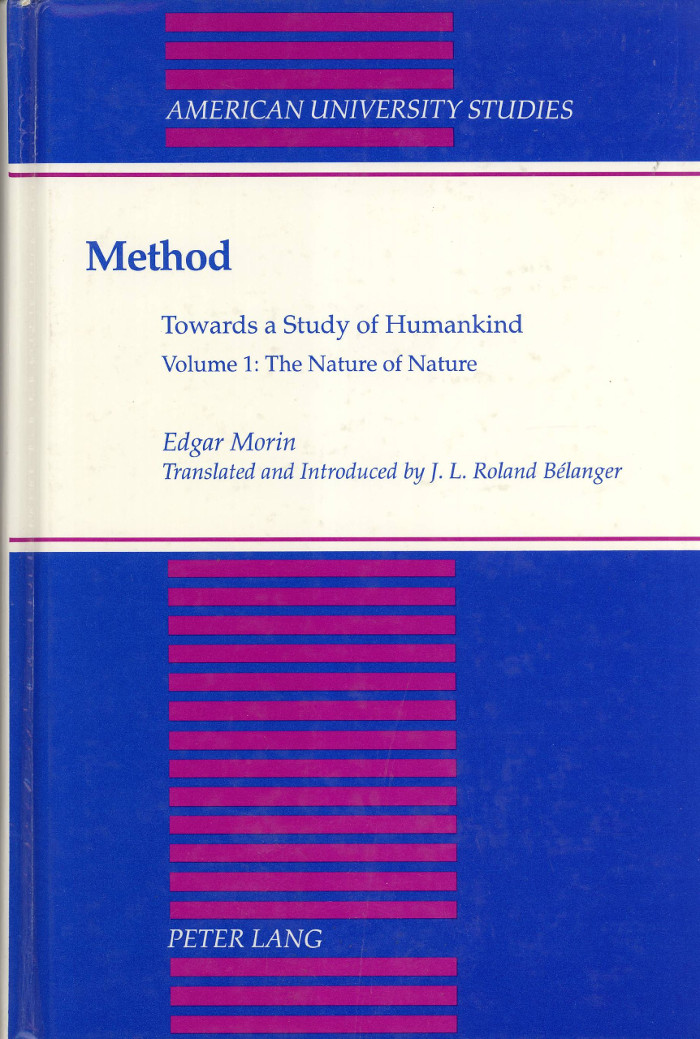Edgar Morin: Method, vol. 1: The Nature of Nature (1977–) [PT, EN, ES]
Filed under book | Tags: · anthropology, being, biology, chaos, complexity, cybernetics, epistemology, event, generativity, human, information theory, knowledge, machine, methodology, nature, organization, physics, politics, recursion, self, sociology, systems theory

“Method: The Nature of Nature is the first of several volumes exposing Edgar Morin’s general systems view on life and society. The present volume maintains that the organization of all life and society necessitates the simultaneous interplay of order and disorder. All systems, physical, biological, social, political and informational, incessantly reshape part and whole through feedback, thereby generating increasingly complex systems. For continued evolution, these simultaneously complementary, concurrent, and antagonistic systems require a priority of love over truth, of subject over object, of Sy-bernetics over cybernetics.”
First published in French as La Méthode, t. 1: La Nature de la nature, 1977.
English edition
Translated and Introduced by J.L. Roland Bélanger
Publisher Peter Lang, 1992
ISBN 0820418781
435 pages
Interview with Morin by his translator Ana Sánchez, 2011
Publisher (EN)
WorldCat (EN)
O método 1. A natureza da natureza (Portuguese, trans. Maria Gabriela de Bragança, 2nd ed., c1987, 12 MB)
Method, 1: The Nature of Nature (English, trans. J.L. Roland Bélanger, 1992, 17 MB)
El método 1. La naturaleza de la naturaleza (Spanish, trans. Ana Sánchez and Dora Sánchez García, 2001, 4 MB)
Niklas Luhmann: The Reality of the Mass Media (1995/2000)
Filed under book | Tags: · autopoiesis, communication, cybernetics, information, mass media, media theory, recursion, social science, systems theory, theory of communication

“In The Reality of the Mass Media, Luhmann extends his theory of social systems — applied in his earlier works to the economy, the political system, art, religion, the sciences, and law — to an examination of the role of mass media in the construction of social reality.
Luhmann argues that the system of mass media is a set of recursive, self-referential programs of communication, whose functions are not determined by the external values of truthfulness, objectivity, or knowledge, nor by specific social interests or political directives. Rather, he contends that the system of mass media is regulated by the internal code information/noninformation, which enables the system to select its information (news) from its own environment and to communicate this information in accordance with its own reflexive criteria.
Despite its self-referential quality, Luhmann describes the mass media as one of the key cognitive systems of modern society, by means of which society constructs the illusion of its own reality. The reality of mass media, he argues, allows societies to process information without destabilizing social roles or overburdening social actors. It forms a broad reservoir (memory) of options for the future coordination of action, and it provides parameters for the stabilization of political reproduction of society, as it produces a continuous self-description of the world around which modern society can orient itself.
In his discussion of mass media, Luhmann elaborates a theory of communication in which communication is seen not as the act of a particular consciousness, nor the medium of integrative social norms, but merely the technical codes through which systemic operations arrange and perpetuate themselves.”
First published as Die Realität der Massenmedien, Westdeutscher Verlag, 1995.
Translated by Kathleen Cross
Published by Stanford University Press, 2000
ISBN 0804740771, 9780804740777
154 pages
Key terms: mass media, second-order cybernetics, autopoiesis, Heinz von Foerster, autopoietic, Laws of Form, Elisabeth Noelle-Neumann, constructivist epistemology, Gregory Bateson, recursive, Spencer Brown, Katherine Hayles, Michel Serres, Baltasar Gracian, Amos Tversky, Hans Ulrich Gumbrecht, munication, Ludwig Tieck
PDF (updated on 2012-7-17)
Comment (0)
